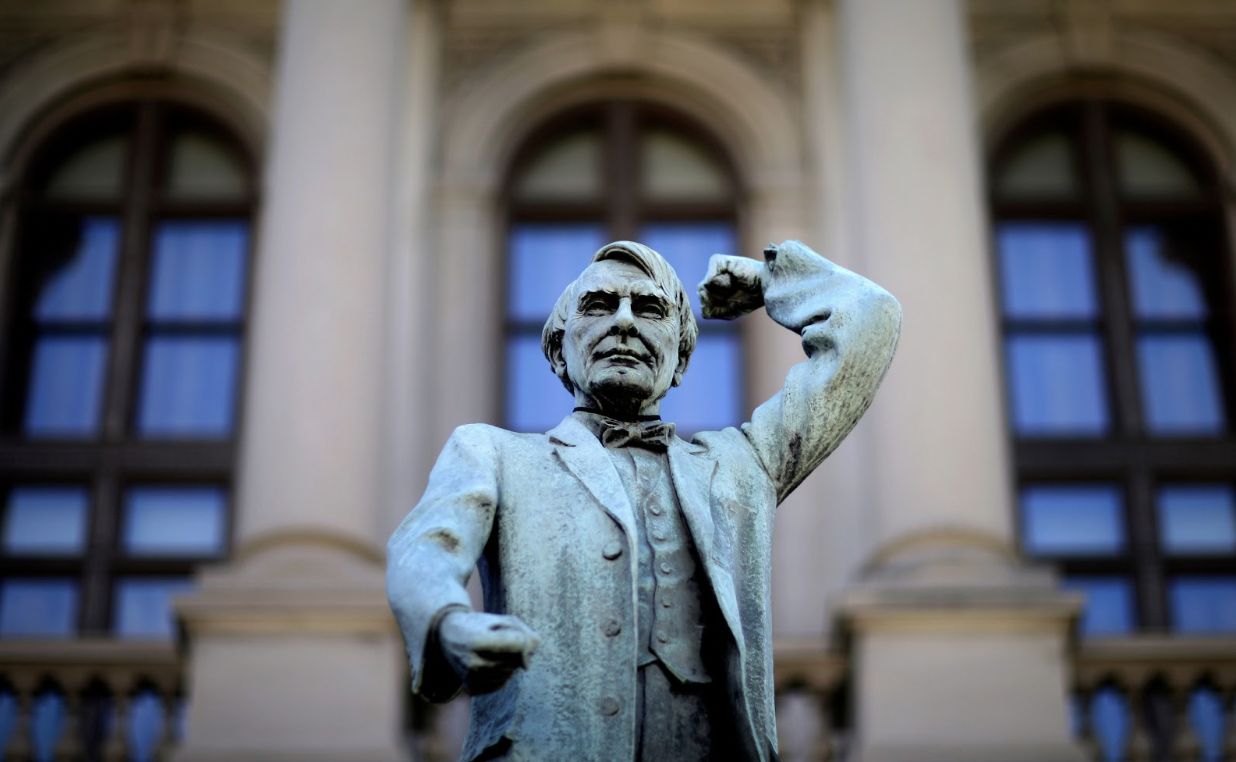
ZACHARY HAGEN-SMITH– NOVEMBER 14TH, 2022
EDITOR: THOMAS GUZMAN
Thomas E. Watson has a memorial in Atlanta, in a park across the street from the Georgia capitol building. The monument consists of a statue of Watson, fists raised, ready to take on the Gilded Age’s establishment powers. A plaque below describes Watson as an editor, lawyer, and statesman “who never faltered in his cause.” It’s all nice, but it’s all wrong. A better statue would be a tombstone and a better line would be taken straight from his obituary: “No other Georgian… has been so hated or so loved.”
Watson was raised on his grandfather’s plantation during the Civil War. In 1865, when he was only nine years old, Confederate and Union forces battled a half-day’s journey away in Aiken, South Carolina. Dozens died and hundreds more were wounded. At the same time, as part of Sherman’s scorched earth campaign, Union troops burned all the North Georgia farmland. Watson’s childhood ended overnight as waves of dying soldiers passed his home and burning fields enclosed it. Even though he was nine, Watson would never forget the brutality of violence.
Following the Civil War, Georgia and the other Confederate states were occupied by American troops. The occupation aimed to facilitate their readmission to the Union and redress the wrongs of slavery, but in doing so, it also represented what Cornell law historian Aziz Rana described in the book The Two Faces of American Freedom, a “key turning point…which indicated the dramatic uses to which federal power could be directed.”
Beyond Reconstruction, the 1860s’ surge in federal government size was driven by a range of legislative developments: the National Banking Act established America’s first national financial system; the Morrill Tariff Act buttressed economic protectionism for American industry; and numerous railroad bills subsidized the construction of transcontinental railways. The combined impact of these measures set the US on track to become the world’s top manufacturing power, however, by bolstering unregulated industry, these measures also spurred unprecedented inequality.
By 1897, America’s 4,000 richest families — less than one percent of the population — held as much wealth as the other 11.6 million households combined.
The Gilded Age saw astonishing achievements in industry but deep failings in popular wellbeing. In the South, expanding factory production and declining agricultural prices reduced most residents, especially African Americans, to low-wage factory labor or sharecropping.
Watson was not immune to the era’s poverty. After his grandfather’s death, Watson’s father, John Smith Watson, inherited the disintegrating plantation. An alcoholic and a gambler, John Watson began to build a new plantation mansion but fell short of funds to plaster on a second story and finish it, preferring to spend on poker and gin. John Watson ultimately sold the property.
Financial strain, induced by his father’s alcoholism, chased Watson through his teenage years, forcing a semi-nomadic coming-of-age and a premature departure from Mercer University, where he had studied history and law. In his memoir, Watson claimed that his father died of pneumonia when Watson was an infant. In reality, his father died when Watson was thirty-nine.
Though he never expressed contempt towards his father, the two weren’t on speaking terms. The more Watson covered his grudge toward his family, the more he projected his anxiety and suspicion onto the outside world.
Though Watson never graduated from college, he passed the bar and quickly became one of Georgia’s most prominent trial lawyers. In 1882, he turned his legal credibility into a successful campaign for Georgia’s state assembly, where he lambasted big banks and business tycoons. Beneath this sweeping rhetoric was Watson’s lingering perception that Georgia’s problems were imposed on it by outsiders, mainly Northern industrialists. Though he condemned white supremacy and actively courted Black voters, he waxed nostalgic for an antebellum South free from federal intervention, violence, and poverty.
In 1890, Watson ran for Congress and won an easy race, but he was a wolf in sheep’s clothing. While he campaigned as a Democrat, Watson felt more aligned with the Farmers’ Alliance.
The Farmers’ Alliance emerged in the late 1800s as a rural counterpart to urban labor movements. The Alliance prioritized unity, encouraging solidarity between workers of all stripes. Industrial and agricultural. Black and White.
Watson’s commitment to the Farmers’ Alliance ran so high that in the 1892 elections, he ran under the new, Alliance-aligned Populist Party. However, abandoning the Democrats left him politically vulnerable. So, he needed Black voters.
Watson was happy to ally with the Black community. In a famous article titled “The Negro Question,” Watson declared that the only people who benefit from racism were divisive politicians who exploited poor people of all colors. In his view, Black farmers suffered from the same economic problems as White farmers, and the two races had “every dictate of reason” to unite in common cause.
Watson’s appeal to Black voters reflected the Populist Party’s multiracial character. The Populists, inheriting the position of its Farmer Alliance forebearer, courted African American voters in southern “Black Belt” districts with promises of a post-racial future.
Though Mississippi passed legislation in 1890 restricting Black voting rights, other states were slower to enact Jim Crow laws. In Georgia, African Americans freely voted until 1908 and their support was crucial for tight races. As historian Charles Postel notes in his history of southern populism, “For the new People’s Party to have any chance of success at the polls, it had to attract a section of the black vote.”
But how do you get Black Americans to vote for Populists?
Solution: Make Populism necessary for Black Americans.
Seeking to integrate the party, Populists ran numerous Black candidates. In 1890, the Kansas People’s Party named Benjamin Foster, a Black reverend, as their candidate for state auditor. Although Foster lost the race, his candidacy made Black membership a recognizable feature of the Populists.
Insider politics functioned along similar lines. The Georgia Populist Party nominated Ephraim White, a respected Black minister, to serve on the state party’s Executive Committee. In endorsing White’s candidacy, Tom Watson exclaimed that “the time has come for the Black man to be meted out simple justice as a citizen of this country.”
Watson’s 1892 congressional campaign reflected that sensibility. In a speech addressing Black voters, Watson advocated for “fair play and fair treatment…irrespective of color.”
If re-elected, he guaranteed that the “color line” would be completely “wipe[d] out”. Watson’s eloquence won him the support of prominent Black leaders, like W.E.B. Du Bois and Georgia preacher H.S. Doyle.
Watson followed his words with action. When Doyle was confronted by a lynch mob, he gave Doyle shelter. Watson called on his supporters to help protect the preacher, and thousands of Populists showed up. They stood guard for over two days.
1. Van Woodward’s esteemed 1938 biography of Watson, epitomized this view of Watson’s 1892 campaign: “[N]ever before or since have the two races in the South come so close together as they did during the Populist struggles”
However, this reading is simplistic.
Though Watson and the People’s Party pioneered a biracial campaign strategy with little precedent, their messaging wasn’t one of multiethnic tolerance.
The fingerprints of prejudice are easy to see in Watson’s “Negro Question” article. Within its first paragraphs, Watson rebukes “race-mixing” and chides Asian and Native Americans as undeserving of legal rights. For Watson, the burden of the “race question” falls on Black Americans, whom he perceives as overly paranoid about a return of slavery. In his world, Black people need to overcome these fears and embrace white people, rather than for white racists to change their own behavior. For Watson, the growing forms of post-Reconstruction racism, like the rise of convict-lease and the Ku Klux Klan, were either not actually racist or unimportant.
Likewise, the two planks Watson proposed to “settle the race question” were comically vague and out of touch. The first was a proposal to introduce an Australian ballot — a measure that would prevent corrupt registrars from excluding Black votes in their final tallies. However, this was irrelevant amid encroaching Jim Crow disenfranchisement. Watson’s second plank advocated letting cash-strapped farmers secure loans by pledging resources, like land or cotton yields, instead of money, however, this also wasn’t much good since most Black farmers were sharecroppers, with little-to-no land or crop surplus.
Watson’s aloofness to Black issues was a symptom of a greater superficiality in the Populist Movement: Black tokenism. Though party leadership ran a number of Black officials for higher office, inclusion was sporadic and mostly to market themselves to crucial Black voters. As one African American delegate noted at the 1892 Populist Convention: “You look over this large assembly and find very few of my people represented”.
In fact, a good deal of Populists were proud racists.
In 1892, the Virginia Populists’ Black-recruitment campaign was forestalled by concerns of potential “Africanization.” Ultimately, Virginia Populists abandoned the program altogether.
The North Carolina Populist Movement held similar prejudices. Its spokesman, Marion Butler, admitted to favoring “white supremacy,” as did North Carolina Populist icon Leonidas L. Polk, who, in defending the state party’s embrace of racism, declared, “We cannot afford to risk Negro supremacy here.”
Duke history professor William H. Chafe found that, in a study of Black voters’ support for the Kansas People’s Party, Black voters who voted Populist did so out of practical safety concerns, not, as Watson thought, in response to economic enticements. According to Chafe, populism ultimately failed “as a biracial movement because Negroes and Whites did not share a common self-interest.”
Watson blamed Black poverty on “a monetary system [that] beggars both [races]”. However, sharecropping problems mostly came from politically influential, local landlords, responsible for poor land management and abusing tenants. Watson himself was one of Georgia’s top landowners and supervised many sharecroppers. Despite the gestures he made towards Black voters, it was not in Watson’s self-interest, or his party’s, to take the necessary steps to support Black interests.
Despite his outreach to the Black community, Watson lost his 1892 congressional race. In 1894, he lost again. In 1896, he ran as the Populist’s vice-presidential nominee, only to be dropped at the last minute as the Democrats and Populists combined their tickets, a merger that essentially killed the Populist movement.
The defeats unearthed a virulent quality in Watson. In an 1894 article, he proclaimed that “whenever we have been beaten, we have been beaten by the negro who sold his vote”.
For several years, Watson hid from public life, writing meticulous biographies on historical figures he admired, like Napoleon Bonaparte and Thomas Jefferson. These years were miserable. “How near I came to loss of mind…,” he wrote to a friend, “If ever a poor devil had been outlawed and persecuted… until he was nigh mad, I was he”.
When Watson returned to politics in 1904 helming a then-irrelevant Populist presidential ticket, Watson was a different man speaking to a different country. His campaigns were rife with anti-Catholic conspiracy theories, denunciations of Socialist Jews, and perverse racism.
“The ballot and the office are not at all essential to the negro’s happiness and prosperity,” Watson declared. “[P]olitical privileges should be withheld”.
Watson’s shift from determined racial tolerance to open white supremacy didn’t happen in a vacuum. As historian Dewey Grantham notes, America’s late nineteenth century was an “era of regression,” characterized by the passage of Plessy v. Ferguson and the disenfranchisement of Black voters throughout the South. Without needing to appeal to African Americans, the Populist party abandoned any pretense of tolerance.
In the words of CSULA professor Eugene Fingerhut, “[W]hen blacks were no longer useful, Watson discarded them. Their political rights were a means to an end”.
Throughout the early 1900s, Watson managed several periodicals. Their profits depended on sensationalism, and what’s more sensational than butt-nut crazy racism. Watson published overplayed accounts of inner-city Black crime and antisemitic op-eds on banking. His conspiracy-laced commentary on the trial of Leo Frank, a Jewish man who had been falsely convicted of rape, fostered a city-wide unrest culminating in Frank’s lynching.
Though Watson grew rich off his papers, he wasn’t happy. During the Frank case, Watson wrote to a physician: “I am so despondent & distressed, about nothing, that it is difficult to live.”
After Watson criticized World War I, amid the Espionage and Sedition Acts’ crackdown on anti-war opposition, the government forced Watson to shut down his papers. Out of a job and skirted by what he saw as the omnipresent threat of big government, Watson decided to run for Senate.
His campaign was a spectacle. When stumping, Watson carried a rifle and an armed horse backed coterie, convinced that the anti-reform establishment wanted him dead. His anti-government crusade was seemingly confirmed by his campaign’s diverse portfolio of legal infractions: creating public disturbances, using profanity in front of women, possessing alcohol. Watson himself was arrested several times for public intoxication. Despite his campaign’s sensationalism, or perhaps because of it, Watson attracted massive audiences everywhere he went, with a following his contemporaries described as “clannish.”
In 1920, after thirty years of failed candidacies, Watson was finally elected to the Senate and by a wide majority. But life as a senator was disappointing.
Watson didn’t feel passionate about politics. On the floor, Watson instead railed against motorcycles and their supposed filthiness. “Those devilish machines,” he called them. Watson also lambasted the Capitol police’s inability to keep squirrels from killing birds and questioned then-Commerce Secretary Herbert Hoover’s credentials as an American. Politically Watson’s senatorial career was uneventful.
“There are no Websters in the Senate with whom to match wits,” he demurred.
Watson filled his time with other endeavors. After six months in DC, Watson, who was sixty-six, challenged three men to fights. The aging politician also had a propensity to threaten his congressional peers with physical violence, and, like his father, to spend far too much on gin and poker.
In 1922, two years into his Senatorial term, a fit of wheeze-coughing seized Watson. The asthma attack spiraled into a cerebral hemorrhage, a “brain stroke”, and Watson died soon after.
“Often his bile was merely amusing,” the New York Times obituary noted. By his death, Watson’s eccentricities were famous. The Jacobin wannabe was DC’s recurring joke.
“For much in ‘Tom’ Watson’s violent career,” the obituary continues, “the most charitable and plausible explanation is a certain mental instability.” Throughout his life, Watson felt lingering feelings of dread and paranoia which he projected onto the “other,” whether political rival or racial minority. Watson could sense that something was wrong, but blinded by his era, profits, and ego, he could never see that the root of this suffering lay deep within himself.
Image Source: New York Times
Disclaimer: The views published in this journal are those of the individual authors or speakers and do not necessarily reflect the position or policy of Berkeley Economic Review staff, the Undergraduate Economics Association, the UC Berkeley Economics Department and faculty, or the University of California, Berkeley in general.



